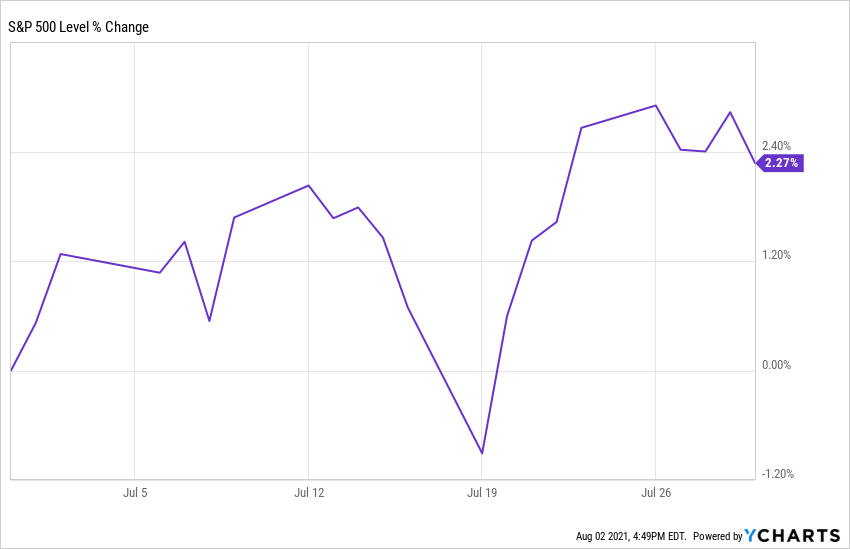Monthly Market Update
Submitted by TLWM Financial on August 2nd, 2021
July began with stocks moving higher as the S&P 500 once again hit all-time highs. (YCharts) Those new highs gave way to some stock market volatility as stocks pulled back throughout the month before finishing up about 2.3%.
While stocks experienced some volatility, the more interesting move this month may have been in fixed income, as the 10 Year US Treasury yield continued its recent drop as investors sought safety in bonds. Yields began the month at 1.45%, then dropped as low as 1.13%, the lowest levels seen since early this year, before closing the month at roughly 1.23%. (YCharts) This drop in yield has a number of potential implications:
- Economic Growth Concerns: the COVID-Delta variant has led to increased case numbers in the US and around the world leading to fears about future lockdowns and the potential impact on economic activity.
- Inflation: Inflation concerns jumped in the first half of the year, along with bond yields. Some have suggested that inflation pressures may be transitory. The recent drop in yields could be a sign that investors feel inflation concerns may have peaked.
- Monetary Policy: central banks around the world have stated that they plan to continue their accommodative policies for the foreseeable future potentially driving rates down.
- Diversification: during periods of volatility, a well-diversified portfolio that includes fixed income helps smooth out bumps in the road.
While some concerns have recently emerged, we continue to think the current environment is positive for stocks over the next 6-9 months as we are seeing good economic growth, impressive corporate earnings, and accommodative monetary policy. We have positioned portfolios accordingly.
We’ll continue to keep a close eye on ongoing developments throughout the year and will be ready to make changes to portfolios as needed. As always, please let us know if you have any questions.
Sincerely,
Your Team at TLWM
*Investment advice offered through TLWM, LLC., a registered investment advisor.
* The Standard & Poor's 500 (S&P 500) is an unmanaged group of securities considered to be representative of the stock market in general. You cannot invest directly in this index.
* The Standard & Poor’s 500 (S&P 500) is an unmanaged index. Unmanaged index returns do not reflect fees, expenses, or sales charges. Index performance is not indicative of the performance of any investment.
* The 10-year Treasury Note represents debt owed by the United States Treasury to the public. Since the U.S. Government is seen as a risk-free borrower, investors use the 10-year Treasury Note as a benchmark for the long-term bond market.
* Government bonds and Treasury Bills are guaranteed by the U.S. government as to the timely payment of principal and interest and, if held to maturity, offer a fixed rate of return and fixed principal value. However, the value of fund shares is not guaranteed and will fluctuate.
* Corporate bonds are considered higher risk than government bonds but normally offer a higher yield and are subject to market, interest rate and credit risk as well as additional risks based on the quality of issuer coupon rate, price, yield, maturity, and redemption features.
*Credit risk can be a factor in situations where an investment’s performance relies on a borrower’s repayment of borrowed funds. With credit risk, an investor can experience a loss or unfavorable performance if a borrower does not repay the borrowed funds as expected or required. Investment holdings that involve forms of indebtedness (i.e. borrowed funds) are subject to credit risk.
* Typically, the values of fixed-income securities change inversely with prevailing interest rates. Therefore, a fundamental risk of fixed-income securities is interest rate risk, which is the risk that their value will generally decline as prevailing interest rates rise, which may cause your account value to likewise decrease, and vice versa. How specific fixed income securities may react to changes in interest rates will depend on the specific characteristics of each security. Fixed-income securities are also subject to credit risk, prepayment risk, valuation risk, and liquidity risk. Credit risk is the chance that a bond issuer will fail to pay interest and principal in a timely manner, or that negative perceptions of the issuer’s ability to make such payments will cause the price of a bond to decline.
* Opinions expressed are subject to change without notice and are not intended as investment advice or to predict future performance.
* Economic forecasts set forth may not develop as predicted and there can be no guarantee that strategies promoted will be successful.
* Past performance does not guarantee future results. Investing involves risk, including loss of principal.
* You cannot invest directly in an index.
* Consult your financial professional before making any investment decision.
* Stock investing involves risk including loss of principal.
* This document is solely for informational purposes. Advisory services are only offered to clients or prospective clients where Texas Legacy Wealth Management and its representatives are properly licensed or exempt from licensure.
* No strategy ensures a profit or protects against a loss.

